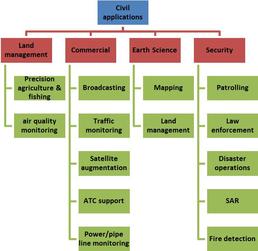Generic Operational Simulation of Civil Unmanned Air Vehicle Operations
- Started
- 1st May 2011
- Investigators
- Hans Fangohr, James Scanlan
Current aerospace design processes largely neglect operational aspects during the early design phase. This can lead to sub-optimal products that are struggling in their operational environment. This research creats a tool for designers of civil Unmanned-Air-Vehicles (UAVs) that allows better understanding of a design in various mission scenarios. The aim is to combine operational outputs with value calculations to show comprehensible, comparable and tracable benchmarks of specific designs conducting specified missions. Designers will be able early on to test design ideas in their intended operational environments and get feedback on product performance. The simulation model will include a wide array of civil UAV missions, combined internally by a unifying ontology that can map any one mission into any other. Included scenarios include:
- Land management
- Broadcasting
- Traffic monitoring
- Pipe line monitoring
- Mapping
- Patrolling
- Search-and-Rescue
- Fire detection
- and more
An initial project covered the operational simulation of Search-and-Rescue missions (see http://cmg.soton.ac.uk/research/projects/operational-simulation-of-the-solent-search-and-rescue-environment/). It helped to design a real UAV designed by the DECODE-team (http://www.soton.ac.uk/~decode/) revealing unexpected results regarding design decisions.
Categories
Physical Systems and Engineering simulation: Flight simulation
Socio-technological System simulation: Transport, Value-driven design
Algorithms and computational methods: Agents, Geographic Information Systems
Simulation software: AnyLogic
Visualisation and data handling software: ArcGIS
Software Engineering Tools: Eclipse
Programming languages and libraries: Java
Computational platforms: Windows
Transdisciplinary tags: Complex Systems, Computer Science, Design, Software Engineering
